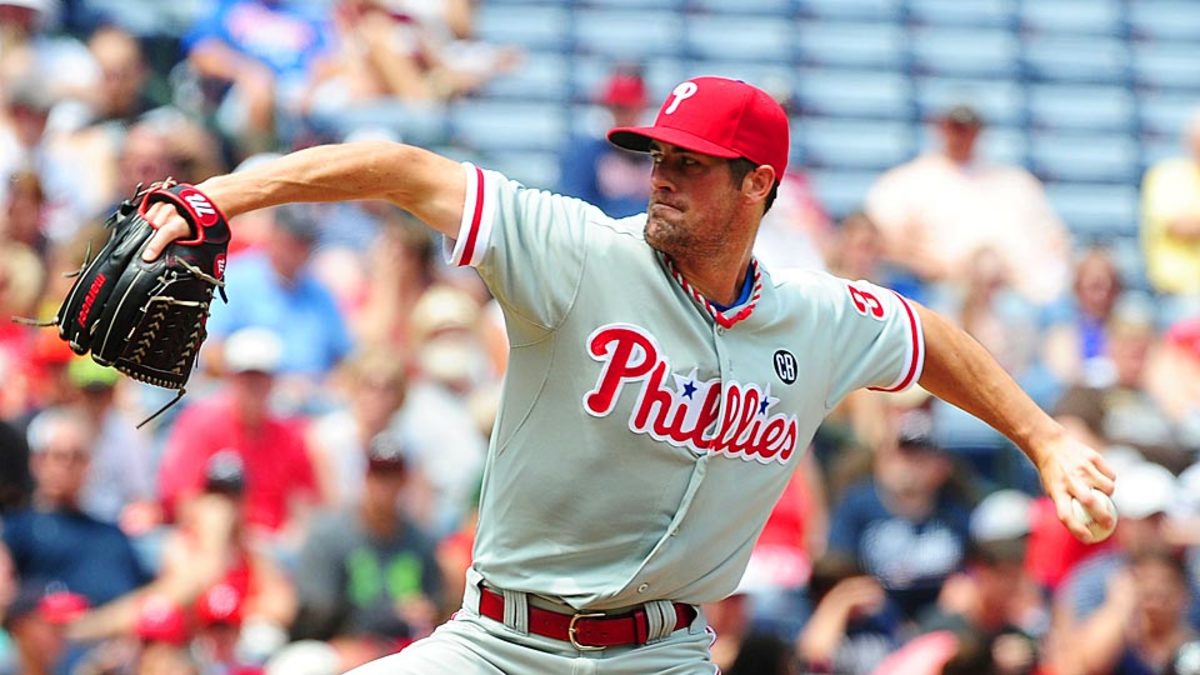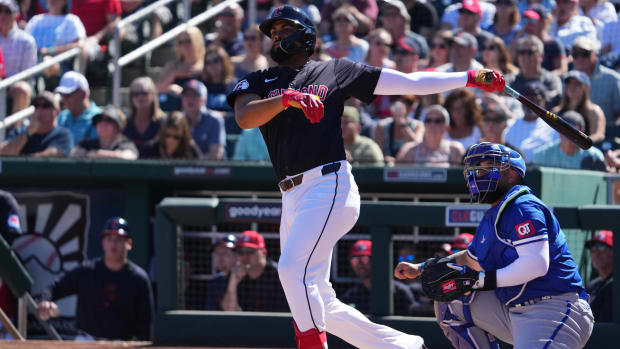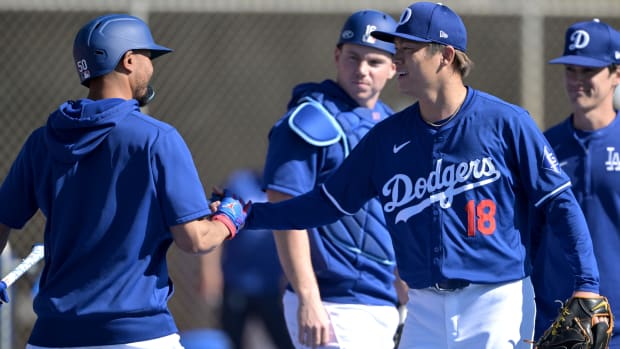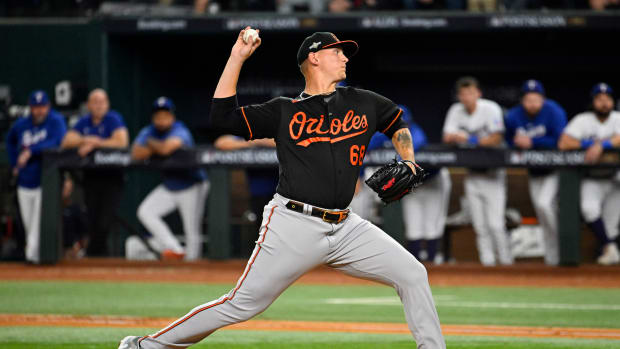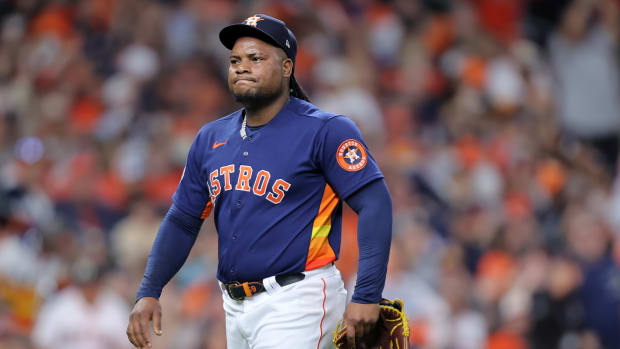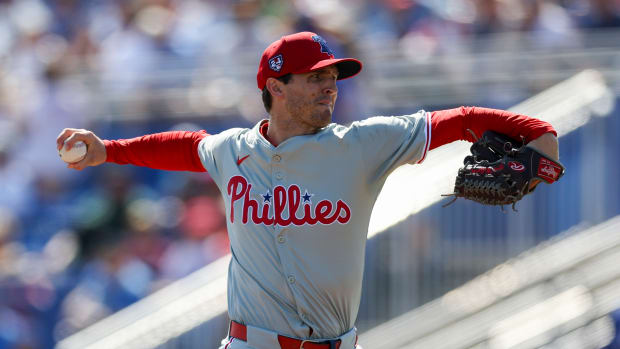Combined no-hitter of Braves is rare bright spot for Hamels, Phillies
A forgettable season for the Phillies enjoyed a brief respite on Monday, as Cole Hamels and three relievers pieced together the season's fourth no-hitter, a 7-0 whitewashing of the Braves in Atlanta. Hamels was effectively wild, struggling with his command to the point that he walked five batters in six innings while throwing 108 pitches, too many to make a complete game a realistic possibility. Manager Ryne Sandberg lifted the 30-year-old lefty for pinch-hitter Grady Sizemore in the top of the seventh, and was rewarded when Ben Revere's subsequent bases-clearing triple broke open what had been a 2-0 game.
After Hamels departed, relievers Jake Diekman, Ken Giles and Jonathan Papelbon combined for five strikeouts, each setting the side down in order. In doing so, they completed the first combined no-hitter in Phillies history and the first in the majors since June 8, 2012, when the Mariners' Kevin Millwood and five relievers combined to hold the Dodgers hitless. Eleven such no-hitters have been authored in all. Here are the previous 10:
date | pitchers | team | opponent |
6/23/1917 | Babe Ruth (0 IP), Ernie Shore (9 IP) | Senators | |
4/30/1967 | Steve Barber (8 2/3), Stu Miller (1/3) | ||
9/28/1975 | Vida Blue (5), Glenn Abbott (1), Paul Lindblad (1), Rollie Fingers (1) | ||
7/28/1976 | Blue Moon Odom (5), Francisco Barrios (4) | Athletics | |
4/11/1990 | Mark Langston (7), Mike Witt (2) | Angels | Mariners |
7/13/1991 | Bob Milacki (6), Mike Flanagan (1), Mark Williamson (1), Gregg Olson (1) | Orioles | Athletics |
9/11/1991 | Kent Mercker (6), Mark Wohlers (2), Alejandro Pena (1) | Braves | |
7/12/1997 | Francisco Cordova (9), Ricardo Rincon (1) | ||
6/11/2003 | Roy Oswalt (1), Pete Munro (2 2/3), Kirk Saarloos (1 1/3), Brad Lidge (2), Octavio Dotel (1), Billy Wagner (1) | Astros | |
6/8/2012 | Kevin Millwood (6), Charlie Furbush (2/3), Stephen Pryor (1/3), Lucas Luetge (1/3), Brandon League (2/3), Tom Wilhelmsen (1) | Mariners | Dodgers |
The no-hitter was the fourth of the season, following those of Josh Beckett (May 25, Dodgers vs. Phillies), Clayton Kershaw (June 18, Dodgers vs. Rockies) and Tim Lincecum (June 25, Giants vs. Padres) and surpassing last year’s total of three. There were seven in 2012, including the aforementioned Millwood combo platter. It was the first no-hitter against the Braves since Apr. 17, 2010, when the Rockies' Ubaldo Jimenez completed the feat, as well as the 12th no-hitter in Phillies history and their first since Oct. 6, 2010, when Roy Halladay blanked the Reds in Game 1 of the National League Division Series. Halladay also owned the team's most recent regular season no-hitter via a perfect game against the Marlins on May 29 of that year.
MLB Power Rankings: Giants surge, Brewers fall as September begins
Carlos Ruiz, who caught both of those outings by Halladay, was Hamels' batterymate as well. By working his third no-hitter, he tied 12 other catchers (Alan Ashby, Yogi Berra, Roy Campanella, Del Crandall, Lou Criger, Silver Flint, Jim Hegan, Charles Johnson, Val Picinich, Ray Schalk, Luke Sewell and Jeff Torborg) for second in that category. Jason Varitek is first with four.
Though he lowered his career-best ERA to 2.50 in delivering his 16th quality start in his last 18 turns, Hamels was erratic enough to tie his season high in walks. He set the tone for the afternoon in a 24-pitch first inning, walking the first two hitters he faced. Jason Heyward stole second prior to Emilio Bonifacio's walk, and after Freddie Freeman struck out, both runners stole again, but Hamels recovered to strike out Justin Upton and get Chris Johnson to line out to left field. He went on to put the leadoff hitter on again in the next two frames, hitting Phil Gosselin with a pitch to start the second and again walking Heyward to start the third. After Bonifacio struck out, Heyward stole second, Freeman walked and Upton advanced both runners via a comebacker, but Marlon Byrd made the defensive play of the game via an impressive diving catch of Johnson's liner to right field:
To that point, Hamels had already thrown 60 pitches. He settled down and retired nine of the final 10 hitters he faced, with a leadoff walk to Freeman to start the sixth the lone exception, but never threw fewer than 14 pitches in an inning, got only two first-pitch outs all afternoon and threw first-pitch strikes to just 13 of the 24 batters he faced. Via the PITCHf/x data at BrooksBaseball.net, though he got just 42 strikes from among the 70 four-seam fastballs he threw, he netted 12 swings and misses via the pitch, and a total of 18 swings and misses in all — one shy of his season high, set in an eight-inning, 10-strikeout performance against the Giants on July 24.
Derek Jeter's farewell, MVP races highlight September's storylines
Hamels did help his cause by figuring in both runs scored by the Phillies while he was in the game. Facing Braves ace Julio Teheran, Cody Asche hit a leadoff double to start the third inning. Hamels sacrificed him to third and then Revere hit a sacrifice fly to left. In the sixth, Hamels stroked a leadoff single, took second on Revere's sacrifice bunt, and scored on a Jimmy Rollins triple.
While Hamels had thrown as many as 133 pitches in a game this year and had reached or exceeded 120 four times, he had no realistic shot at a complete game without heading well past 140 or even 150 pitches. In the top of the seventh, when Domonic Brown reached on an Andrelton Simmons error, stole second and was joined on the bases via an intentional walk to Cody Asche, Sandberg elected to lift his starter in favor of a pinch-hitter. Sizemore worked a six-pitch walk, and then Revere clubbed a pitch over Heyward's head into the right-center field gap, running the score to 5-0 and chasing Teheran.
When he took the mound, Diekman apparently had no idea that the Braves had yet to collect a hit until he saw the scoreboard. He struck out Simmons and Gerald Laird, the first two hitters he faced, and Giles one-upped him by whiffing the side in the eighth. Papelbon, who had to wait out a lengthy two-run rally by the Phillies in the eighth, didn't strike out anybody. He benefited from a pair of strong defensive plays behind him. With one out, Johnson hit a broken-bat grounder up the middle that Rollins was fortunate to catch up to on the right side of second base, and with two outs, Gosselin hit a liner right at Darin Ruf, who had just entered the game as a defensive replacement for Ryan Howard. You can see both plays toward the end of this supercut of all 27 outs:
The no-hitter carved a well-deserved spot in franchise lore, but even in giving the Phillies their eighth win in 11 games, the team is just 63-74, likely headed for a second straight losing season. On the other side of the coin, the loss was a significant blow for the Braves (72-66), who now trail the Nationals by 6 1/2 games in the NL East and are 1 1/2 back in the Wild Card race. Since starting the year 17-7, they're 55-59, though they have won 10 of their past 16.
Ranking the best playoff races in MLB's final month of play
It isn't terribly surprising that the Braves were on the wrong end of a no-hitter, as their offense is one of the NL’s worst. The team ranks second-to-last in the league in scoring (3.72 runs per game) and is 10th in batting average on a .245/.310/.370 line. And while it's a small sample size, they've hit just .223/.306/.345 in day games en route to the league’s worst batting average and slugging percentage in that split.
While the Braves were fielding something close to their regular lineup, September is a month rife with no-hitters thanks to minor league call-ups and teams playing out the string. Of the 286 official ones in major league history dating back to 1876, 61 have taken place in September and another eight in October, only two of which came in the postseason. Excluding those two, that’s 24 percent of no-hitters that have come late in what tends to be a six-month season. Of the past nine seasons dating to 2006, six have featured no-hitters in September.






























